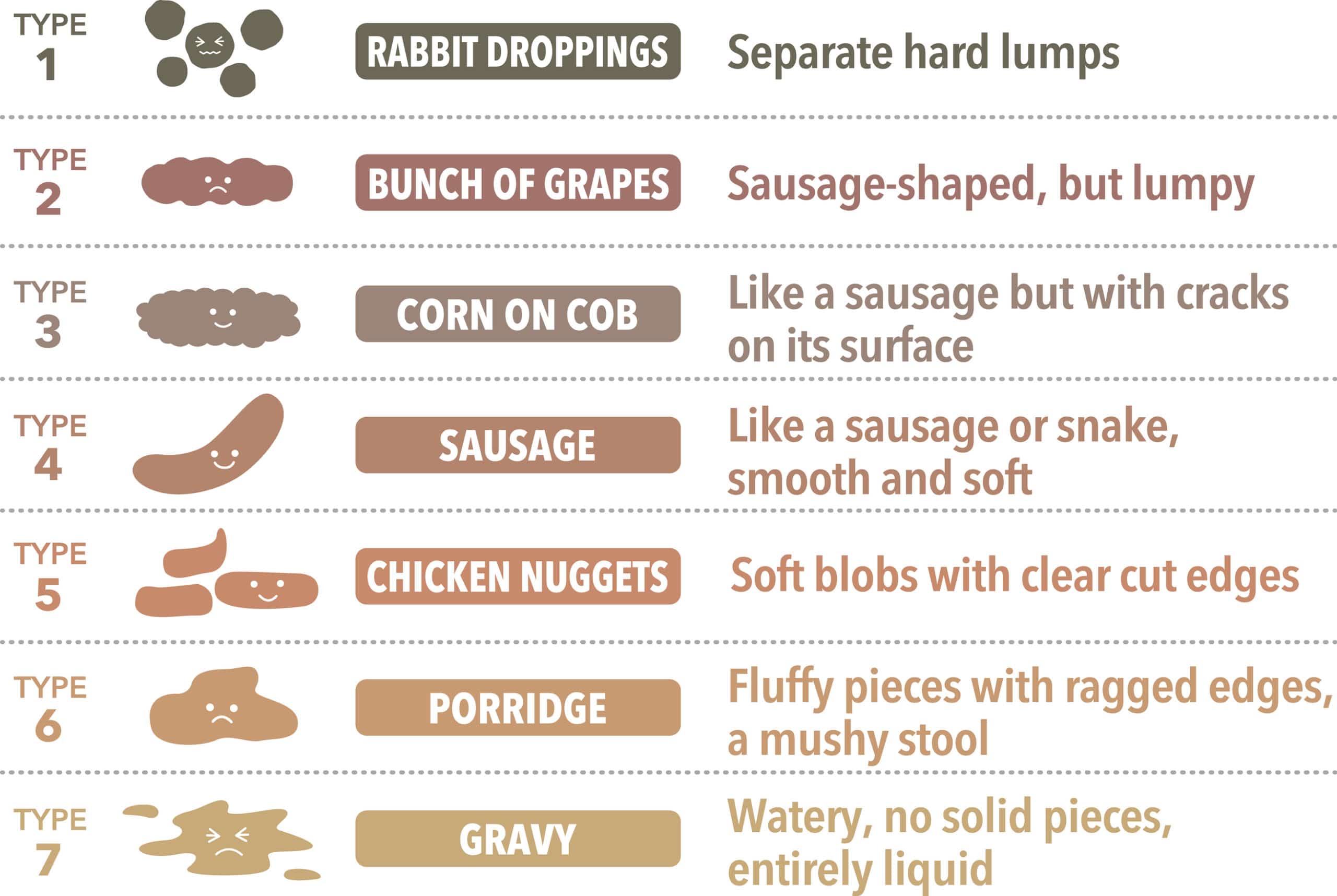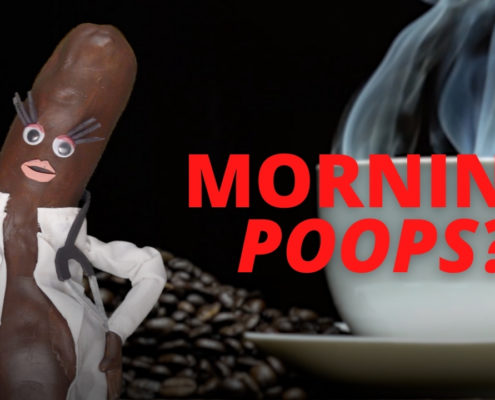When Am I Done Pooping?
Click Here For Transcript of "When am I done pooping?" Video
WAIT, DON’T GO!
Sorry I’m late, I was…
Well, do you ever wonder “When I am “done” pooping?”
That’s a normal question, right?
Well, Poo Dr. has some answers.
A feeling of incomplete pooping — like you pooped but feel like there’s “leftovers” that won’t come out — could be because of something like IBS or motility dysfunction – which is a problem with the muscles in your digestive tract.
Here’s my top 3 tips for complete and enjoyable poops.
First, get on a proper poo schedule.
Trying to go at around the same time every day can be a big help to your physiology.
Second, don’t check out of the process completely.
If you’re using your poo time for Facebook browsing, then you might be depriving your body of its ability to do what it came there to do.
Finally, make sure you are not deficient in a little-known super nutrient to make all your poops complete and marching on out of there like a perfect end to… a perfect end.
Ha!
Click below for details and to check if you are deficient! Until next time, like for good poop, share for great poop.
See ya!
It’s a question few may openly ask, but many ponder in silence: “When am I truly done pooping?” This seemingly simple query taps into the heart of digestive health—a topic of paramount importance yet often enveloped in unnecessary secrecy.
Understanding the subtleties of a healthy bathroom routine is more than a matter of convenience; it’s crucial for maintaining long-term wellness and comfort.
Navigating the nuances of bowel movements isn’t just about recognizing when to step away from the toilet—it’s about tuning in to your body’s natural rhythms and signals. The body speaks a language all its own, and learning to interpret its messages can unexpectedly enhance your health.
This discussion aims to demystify the experiences behind the bathroom door, encouraging a more informed and open dialogue about a subject that affects everyone daily.
Curious to explore how your daily routines align with optimal digestive health? This article invites you to understand bathroom habits deeper, not only to better care for yourself but to foster conversations that break the taboos surrounding bathroom habits.
Share this read with friends and family—it’s a topic that might seem personal but universally relates to our collective health. Let’s bring this essential discussion to light, one flush at a time.
Understanding Incomplete Bowel Movements and Bowel Function
An incomplete bowel movement—where you feel you haven’t fully emptied your bowels—can be both uncomfortable and concerning. This sensation often leaves you feeling like there’s more to pass, despite multiple trips to the bathroom. Understanding how your bowels work is key to addressing this common issue.
The bowels, primarily comprising the small and large intestines, play a critical role in digestion and waste elimination. After food is broken down in the stomach, it moves to the small intestine, where nutrients are absorbed. What remains, largely indigestible matter, then travels to the large intestine or colon. Here, water is absorbed, and the waste is gradually turned into stool.
The movement of waste through the colon is controlled by muscles that contract rhythmically. This process, known as peristalsis, pushes stool toward the rectum, where it is stored until you feel the urge to defecate. An incomplete bowel movement can occur if the peristalsis is disrupted or there is an obstruction in the colon.
Stress, dietary habits, and physical activity levels can influence this process, affecting how thoroughly you empty your bowels.
Addressing incomplete bowel movements often involves a combination of dietary adjustments, such as increasing fiber and water intake, and lifestyle changes, including regular exercise. Understanding the intricate dance of digestion and bowel movements can empower you to take proactive steps toward improving your digestive health and comfort.
Exploring the Reasons Behind Incomplete Bowel Movements
Experiencing incomplete bowel movements can be frustrating and uncomfortable, often leaving you feeling like you need to return to the bathroom shortly after leaving. Several factors can contribute to this sensation, which, if understood, can help manage and potentially alleviate the issue.
Here’s a deeper look at some common reasons you might not feel fully relieved after a bowel movement.
1. Low Fiber Intake
Fiber plays a crucial role in forming stool and helping it move smoothly through the digestive tract. A diet low in fiber can lead to harder stools that are difficult to pass and may not evacuate the colon completely.
It can even lead to chronic constipation. Including a variety of fiber-rich foods such as fruits and vegetables can help create bulkier, softer stools that are easier to pass.
2. Dehydration
Adequate hydration is essential for softening stool, making it easier to pass completely. Without enough water, stool can become dry and compact, making evacuation more challenging and often incomplete. Consuming sufficient daily fluids can help maintain regular and complete bowel movements.
3. Sedentary Lifestyle
Regular physical activity helps increase blood flow and stimulate intestinal contractions, both of which aid in moving stool through the colon more efficiently. A lack of exercise can slow down this process, leading to incomplete bowel movements.
Moderate exercise, such as walking or yoga, can improve digestive health.
4. Stress and Anxiety
The digestive system is highly sensitive to stress and emotional states. Stress can interfere with the normal rhythms of digestion and bowel movement, often leading to spasmodic contractions that result in incomplete evacuation.
Managing stress through relaxation techniques or therapy can help regulate bowel movements.
5. Medications
Certain medications, including narcotics, some antacids, blood pressure medications, and supplements like iron, can affect bowel movement regularity and completeness. They may slow down the digestive system or harden the stool, making it challenging to pass entirely.
If you suspect medication is contributing to incomplete bowel movements, consulting with a healthcare provider about alternatives or adjustments is advisable.
6. Medical Conditions
Several health conditions, like irritable bowel syndrome (IBS), thyroid disorders, pelvic floor dysfunction, and diabetes, can affect how completely the bowels are emptied. These conditions may alter gut motility or the consistency of stool, leading to feelings of incomplete evacuation.
A healthcare provider can diagnose these conditions and recommend appropriate treatments.
Understanding these factors can be the first step toward addressing and managing incomplete bowel movements.
Making lifestyle adjustments based on these insights can significantly enhance digestive comfort and overall quality of life.
Natural Strategies for Promoting Complete Bowel Movements
Ensuring you regularly have a complete bowel movement is essential for comfort and health, preventing discomfort and the potential complications of incomplete evacuation.
While there are several medical ways to address this issue, such as stool softeners, numerous natural methods can also help enhance your digestive system’s efficiency and relieve symptoms.
Here are five natural approaches to encouraging more complete bowel movements:
1. Increase Dietary Fiber
Incorporating more fiber into your diet is one of the most effective ways to ensure complete bowel movements. Fiber adds bulk and softness to stool, making it easier to pass through the intestines.
Fiber-rich foods include fruits, vegetables, legumes, and whole grains. Start gradually to allow your digestive system to adjust without causing gas or bloating.
2. Stay Hydrated
Drinking enough water is crucial for digestion. Water helps dissolve fats and soluble fiber, allowing for a smoother and softer stool that is easier to pass.
Aim for at least eight 8-ounce glasses of fluid per day, preferably water, as hydration is key to preventing constipation and promoting complete bowel movements.
3. Regular Exercise
Physical activity stimulates intestinal muscles, aiding digestion. Even light exercise, such as walking or yoga, can significantly improve bowel regularity and completeness.
Aim to incorporate some form of physical activity into your daily routine.
4. Establish a Routine
Your body thrives on routine. Going to the bathroom at the same time each day can help train your digestive system to have regular and complete bowel movements.
Morning is often ideal as your body’s natural rhythms are more conducive to bowel movements after waking.
5. Mindful Eating Practices
Eating slowly and chewing thoroughly are simple yet effective strategies to aid digestion and absorption of nutrients, which can lead to more regular and complete bowel movements.
Mindful eating helps prevent excessive air swallowing, which can contribute to bloating and constipation, further complicating the digestive process.
Integrating these natural methods into your daily routine promotes healthier, more complete bowel movements. These habits not only support digestive health but also contribute to overall well-being, providing a simple yet effective way to maintain balance in your body’s digestive system.
FAQ: Essential Insights into Digestive Health
Maintaining digestive health is crucial for overall well-being, affecting everything from mood to immunity. Here are some commonly asked questions about digestive health, offering practical insights to help you understand and care for your digestive system effectively.
1. What are the signs of a healthy digestive system?
A healthy digestive system typically manifests through regular bowel movements free from discomfort. Ideal stools are soft and formed, making them easy to pass without straining or pain.
Other signs of good digestive health include minimal gas, no frequent bloating or stomach cramps, and a general feeling of well-being after meals rather than discomfort or fatigue.
2. How does diet affect digestive health?
The diet plays a pivotal role in maintaining digestive health. A balanced diet rich in fiber from fruits and vegetables promotes regular bowel movements and prevents constipation.
On the other hand, diets high in processed foods and low in fiber can lead to various digestive issues, including bloating, gas, and irregular bowel movements. Probiotics in yogurt and fermented foods can also support gut health by enhancing the microbiome.
3. What lifestyle factors can improve digestive health?
Alongside diet, lifestyle factors such as regular exercise and adequate hydration significantly impact digestive health. Physical activity helps stimulate intestinal contractions for better bowel movement regularity. Hydration aids in softening stool, which facilitates smoother passage through the colon.
Additionally, managing stress through activities like meditation or regular relaxation can positively affect gut health, as stress negatively impacts gut motility and function.
4. How important is the gut microbiota for digestive health?
The gut microbiota is vital for optimal digestive health as it assists in breaking down food components that the stomach and small intestine have not digested. A balanced microbiota aids nutrient absorption, helps synthesize certain vitamins, and protects against pathogens.
Disruptions to this balance can lead to numerous health issues, including inflammatory bowel diseases and even mental health challenges. Eating a variety of foods rich in fiber and probiotics can support a healthy microbiota.
5. When should one consult a healthcare provider about digestive issues?
Consultation with a healthcare provider is recommended if you experience persistent, severe symptoms such as changes in bowel habits, frequent abdominal discomfort or pain, unexplained weight loss, or blood in the stool.
These symptoms could indicate underlying conditions that require medical attention. Early diagnosis and management are crucial for effective treatment and can prevent more severe complications in the digestive system.
Understanding these key aspects of digestive health can empower you to make informed decisions about diet and lifestyle, contributing to a healthier digestive system and overall better health. If you experience ongoing digestive issues, seeking advice from a healthcare professional is always the best course of action.
Conclusion: Understanding Your Body’s Signals
Recognizing when you are truly done with a bowel movement is a key component of digestive health. This awareness not only adds comfort to your day but also provides insights into your overall well-being.
If you’ve found this exploration into the body’s natural processes enlightening, consider sharing it. Spread the knowledge with friends and family via social media or email—it’s a discussion that offers practical benefits and supports health awareness, enhancing daily comfort and well-being for everyone. Let’s keep the conversation on health and wellness open and ong
Though fixing your poop issues may seem hopeless at times, it’s easier than you may think. You can improve regularity and enjoy completely satisfying poops with a patented molecule that is backed by Ivy League doctors! Click here to learn more about this groundbreaking poop fix formula and to place your order TODAY
Types of poop encountered are categorized by the Bristol Stool Chart. This chart is a generalized indicator of how or why different types of poops look and feel a certain way. The 7 types of poop are broken up into categories based on a 2,000-person study!

Does your poo look this good? If you have Bristol Type 3 or 4 – your poop is considered “normal”! Bristol Type 1 or 2, is where the poop is hard and difficult to pass, are indicative of constipation. Often, these types of stool can be painful to pass – but don’t worry – Doctor Poo has a recommended healthy-gut switch solution…just keep reading!
Should you ever worry about your poop?
Always consult your healthcare provider if you have any concerns about what your poop means. People are asked to call their healthcare providers if: They experience severe levels of abdominal pain or discomfort with diarrhea that does not go away when they poop or fart. Also, if diarrhea is accompanied by a fever of 101 degrees Fahrenheit or higher, chills, vomiting, or fainting, call your physician immediately.
What is unhealthy poop?
An unhealthy poop is when one poops too often (hence, your doctor asking you if you poop more than three times daily) or not poops often enough (As such, less than three times a week) and also excessive straining when pooping. Poop that is colored red, black, green, yellow, or white. greasy or fatty stools are unhealthy.
Help fix so many of your digestive and bathroom issues, such as gas and bloating and improve your overall health with this patented molecule that is backed by Ivy League Doctors by clicking here!
Doctor Poo Provides More Valuable Answers for Those Hard-to-Ask Questions Below:













Trackbacks & Pingbacks
[…] post When Am I Done Pooping? appeared first on SANESolution | Proven & Powerful […]
[…] post When Am I Done Pooping? appeared first on SANESolution | Proven & Powerful […]
Comments are closed.